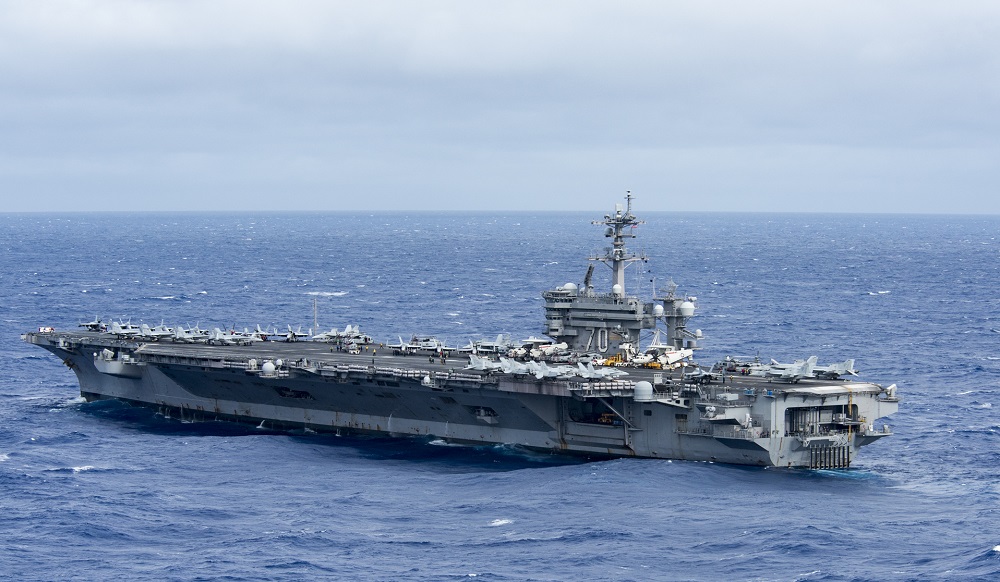
- CNN reports that The United States deployed the aircraft carrier USS Carl Vinson to the disputed waters of the South China Sea on Saturday as part of maritime "routine operations. "Sailing with the 97,000-ton Vinson is the guided-missile destroyer USS Wayne E. Meyer, the Navy said in a statement. The Vinson carries a flight group of more than 60 aircraft, including F/A-18 jet fighters. The operation comes amid growing tensions between the United States and China over territory and trade, and as the Trump administration looks set to take a more confrontational stance toward China than its predecessor. During his confirmation hearing, new Secretary of State Rex Tillerson said China should be blocked from accessing the artificial islands it's built, setting the stage for a potential showdown. In a news conference Wednesday, China's Foreign Ministry said it heard about the planned deployment of the Vinson days before it happened, and warned Washington against challenging its sovereignty.
- Reuters reports that overseas acquisitions by Chinese buyers are cooling after two record years as Beijing reins in capital outflows, but deals into China are on the rise, and new rules will make it easier for foreign buyers to tap China's giant consumer potential.Inbound M&A deals have already reached $7.1 billion so far in 2017, almost double the amount in the same period last year and are well on track to beat the 2016 total of $46 billion, while outbound deals tumbled more than 40 percent to $8.4 billion, Thomson Reuters data showed.Deals in retail and consumer staples accounted for nearly half those early transactions, far outpacing real estate and financial deals, which usually dominate inbound M&A...The leadership in Beijing has long been trying to rebalance the economy away from infrastructure, heavy industry and export-led growth and towards domestic consumption, so in theory such investment should be welcome, but in practice foreign capital has fallen foul of barriers to entry...That appears to be changing. After a trial in a few of its free-trade zones, China in October expanded to the entire country a new liberalization program.Apart from a "negative list" of industries deemed too sensitive, foreign investments no longer need to go through a cumbersome approval system, and there has even been some loosening in the off-limits list.
Bloomberg reports President Donald Trump would have the support of Congress if he declared China a currency manipulator, as he pledged during the election campaign, according to two members of the Senate Foreign Relations Committee. Senator Lindsey Graham of South Carolina, a Republican, said on a panel at the Munich Security Conference on Sunday that the Republican-led Congress has an opportunity to unite around action against China."There's bipartisan support to declare China a currency manipulator," said Graham, whose stance was backed by Jeanne Shaheen, a Democrat from New Hampshire. "I don't want a war with China; I want a better relationship. But what they're doing needs to be pushed back against -- and I think currency manipulation will be an issue that may unite the Congress." While the U.S. has long accused China of undervaluing its currency to boost exports, Beijing has actually been burning through foreign reserves to support the yuan amid an economic slowdown and capital outflows. The yuan gained 0.9 percent against the dollar in January, its steepest advance since March, after sinking 13 percent in the three years through 2016.
- 2017-02-17 Tillerson Urges China to Confront North Korean Provocations
- 2017-02-16 How Americans and Chinese view their countries and each other, in three charts
- 2017-02-15 Killing of Kim Jong Un’s Brother Intrigues North Korea’s Estranged Ally China
- 2017-02-14 China's credit growth poses challenge, but tightening seen gradual
- 2017-02-13 North Korea: missile test success claim as China rejects US criticism
- 2017-02-12 RPT-China gets an early win off Trump, but many battles remain
- 2017-02-10 Beijing’s Patience Pays Off With Trump’s Reaffirmation of ‘One-China’ Policy
- 2017-02-09 China Praises Trump's Letter to Xi, Belated Well-Wishes
- 2017-02-08 Task force backs Trump’s tough line on China trade
- 2017-02-07 China, United States cannot afford conflict: Chinese foreign minister
- Wall Street Journal China Halts Import of North Korean Coal Until End of Year
- The Telegraph China's terracotta army prepares for war - against replicas
- New York Times UAE Seals Deal With China's CNPC for Onshore Oil Project
- uk.reuters.com RPT-UPDATE 1-China to suspend all imports of coal from North Korea
- Fox News National Zoo prepares to say goodbye to giant panda Bao Bao
- USA Today US deploys carrier to contentious South China Sea
- Reuters China's property investment to grow less rapidly this year: report
- Financial Times HK protest leader crowdfunds research to back self-determination
- uk.reuters.com US pushes Beijing to keep up pressure on North Korea
- New York Times China Fights Spread of Deadly Avian Virus
- Reuters Taiwan regrets Spanish decision to deport Taiwanese to China in fraud case
- nationalinterest.org Why China Fears (And Plans to Sink) America's Aircraft Carriers
- Bloomberg China's Message to Trump With North Korea Coal Ban: Let's Deal
- Forbes China's Extraordinarily Expensive Recovery
- nationalinterest.org China Cannot Be Expected to Punish North Korea
- The Telegraph Trump's trade plans could knock China's rise to riches off course
